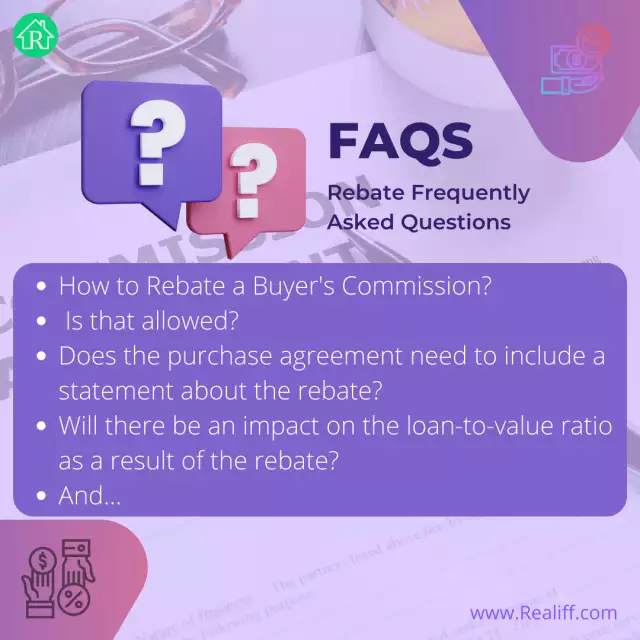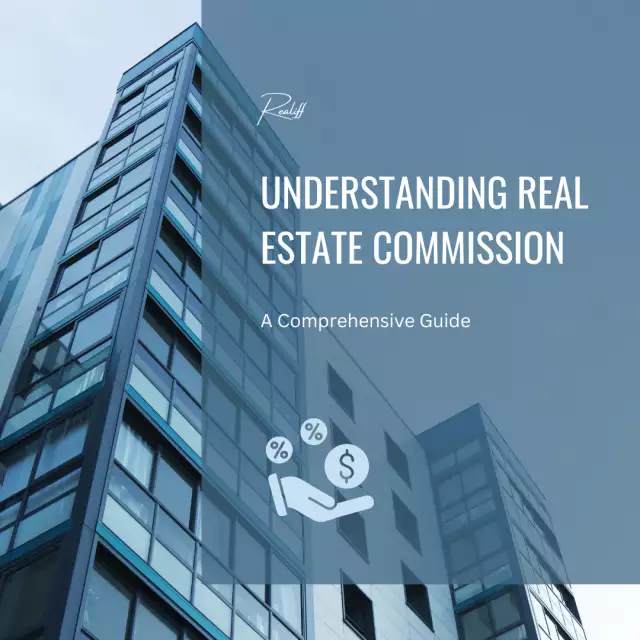Navigating Real Estate Commission Rebates: Your Ultimate Guide
Navigating Real Estate Commission Rebates: Your Ultimate Guide
Real estate transactions often involve substantial costs, with agent commissions taking a significant slice of the pie. However, there’s a growing trend that savvy buyers are using to mitigate these expenses: real estate commission rebates. This comprehensive guide will walk you through the process of securing a commission rebate, the legal considerations involved, and how services like Realiff can make the process seamless and rewarding.
Understanding Real Estate Commission Rebates
What Is a Real Estate Commission Rebate?
A real estate commission rebate is a portion of the commission that a buyer’s agent earns, which is then returned to the buyer. This rebate can significantly lower the overall cost of purchasing a home. For example, if the buyer's agent earns a 3% commission on a $300,000 home, a 1.5% rebate would return $4,500 to the buyer.
How Do Commission Rebates Work?
The rebate process typically involves the following steps:
- Disclosure:The rebate must be disclosed in the Closing Disclosure document under "Other Credits".
- Escrow Payment:The rebate is paid through the escrow process to ensure it is properly documented and applied.
- Lender Approval:The rebate must be approved by the lender, as it may affect the loan-to-value ratio and how the funds can be used.
Legal and Financial Considerations
Compliance with TRID Guidelines
According to the TRID (TILA RESPA Integrated Disclosure)
guidelines, any rebate offered by the buyer’s agent must be
disclosed in the transaction's financial documentation. This
ensures transparency and compliance with federal regulations.

Impact on Loan-to-Value Ratio
Rebates can impact the loan-to-value (LTV) ratio, a critical factor in mortgage approval. Most lenders treat rebates as a form of seller credit, which can only be applied towards closing costs, fees, or prepaids. They generally do not allow rebates to be used as part of the down payment.
Dual Agency Disclosure
In cases of dual agency, where the same agent represents both the buyer and the seller, it is crucial to disclose the rebate offer to both parties. This transparency helps in maintaining fiduciary responsibilities and avoiding conflicts of interest.
How to Secure a Commission Rebate
Steps to Obtain a Rebate
- Choose a Rebate-Friendly Agent:Select an agent or brokerage known for offering rebates. Realiff simplifies this process by connecting you with agents who provide rebates as part of their services.
- Discuss Rebate Terms Early:Clearly understand and agree upon the rebate terms before engaging in the home buying process.
- Ensure Lender Approval:Before finalizing your mortgage, discuss the rebate with your lender to ensure it won’t affect your loan terms negatively.
- Document Everything:Make sure all rebate agreements are documented in writing and included in your closing documents.

Common Scenarios and Solutions
Rebate Not Accepted by Lender
If the lender does not approve the rebate, it typically means the funds cannot be used as intended. However, because the rebate agreement should state that it's contingent upon lender approval, you will not be liable to provide the rebate out of pocket.
Rebate Disclosure in Dual Agency
If you are involved in a dual agency scenario, inform the seller about the rebate as soon as possible. This disclosure is necessary to maintain trust and comply with legal obligations.
Benefits of Using Realiff for Commission Rebates
Why Choose Realiff?
Realiff offers a hassle-free way to secure commission rebates:
- No Fees:Realiff doesn’t charge any fees for facilitating rebates.
- Expert Handling:They manage appointments, paperwork, and negotiations on your behalf.
- Guaranteed Rebates:Realiff ensures that you receive your rebate at closing, making the process straightforward and reliable.
Simplifying the Rebate Process
Realiff takes the complexity out of securing rebates by:
- Connecting with Rebate-Friendly Agents:Realiff matches you with top-rated agents who are willing to offer rebates.
- Managing Documentation:They handle all necessary paperwork and ensure compliance with disclosure requirements.
- Providing Clear Communication:Realiff keeps you informed at every step, ensuring you understand the process and receive your rebate smoothly.
Key Questions About Real Estate Commission Rebates
Common Questions and Answers
Q: Why is a commission rebate not considered taxable
income?
A:A rebate is seen as a reduction in the purchase
price of the home, rather than income, which is why it is not
taxed.
Q: When should I inform my lender about a
rebate?
A:You should inform your lender about the rebate
during the prequalification process to ensure it’s factored into
your loan approval.
Q: Where should the rebate be disclosed in transaction
documents?
A:Rebates should be disclosed in the Closing
Disclosure under "Other Credits" as per TRID guidelines.
Q: What happens if the rebate impacts the loan-to-value
ratio?
A:If the rebate affects the LTV ratio, the lender
may limit its use to certain closing costs or fees. It’s essential
to confirm this with your lender beforehand.
Q: Who needs to be informed about the rebate in a dual
agency scenario?
A:Both the buyer and the seller must be informed
about the rebate in dual agency situations to ensure transparency
and compliance with fiduciary duties.
Q: How can Realiff help with securing a
rebate?
A:Realiff simplifies the process by managing all
aspects of securing a rebate, from connecting with agents to
handling documentation and ensuring lender approval.
Q: How do rebates affect my home’s purchase price
basis?
A:Rebates effectively lower the purchase price of
the home, which adjusts the buyer’s basis in the property for tax
purposes.
Q: Can a rebate be used as part of the down
payment?
A:Typically, rebates cannot be used as part of the
down payment. They are usually applied towards closing costs and
related expenses.
The Most Comprehensive Tips for All Aspects of Real Estate Commission Rebates
- Select Rebate-Friendly Agents:Choose agents or brokers who openly offer rebates as part of their service.
- Understand Rebate Terms:Clarify the rebate terms with your agent and ensure they are documented.
- Inform Your Lender Early:Discuss the rebate with your lender to avoid any surprises at closing.
- Keep Detailed Records:Document all aspects of the rebate agreement and ensure they are reflected in closing documents.
- Use Realiff for Simplicity:Leverage Realiff’s services to connect with agents, manage paperwork, and secure your rebate easily.
- Review Dual Agency Requirements:If involved in dual agency, ensure all parties are informed about the rebate.
- Know Your Tax Implications:Understand how rebates affect your home’s purchase price basis for tax purposes.
- Plan for LTV Impact:Be aware of how rebates can impact your loan-to-value ratio and plan accordingly with your lender.
Conclusion
Real estate commission rebates provide a significant opportunity for buyers to save on the costs of purchasing a home. Understanding how to navigate the rebate process, comply with legal requirements, and leverage services like Realiff can make securing these rebates straightforward and beneficial. By following the tips and strategies outlined in this guide, you can maximize your savings and enjoy a smoother, more cost-effective home buying experience.
Realiff.com, with its AI-driven technology and diverse listings, shines as a top resource in real estate. It offers valuable insights for buyers and sellers. Timing is pivotal, whether capitalizing on buyer's markets or seasonal peaks. Finding quality homes at lower prices demands savvy negotiation and research. By leveraging these tools and strategies, Realiff.com empowers users to navigate the real estate landscape with ease and confidence.








